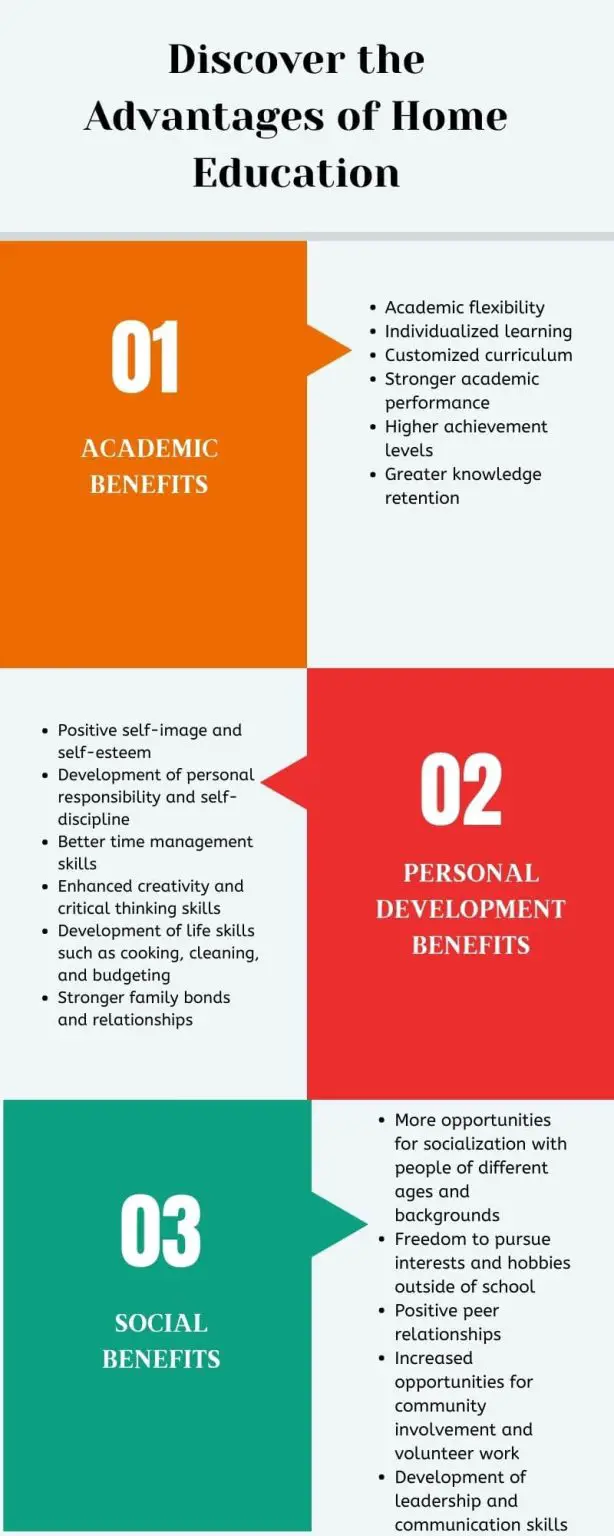Discover The Advantages of Home Education

Are you considering home education for your child in the UK? Whether you’re unhappy with the traditional schooling system, looking for a more personalised approach to education, or just want more flexibility in your child’s learning, the advantages of home education could be a great option for your family.
In this article, we’ll explore the benefits of home education in the UK. From academic advantages to personal development benefits and social benefits, we’ll take a closer look at why more and more families are choosing home education as an alternative to traditional schooling.
So, grab a cup of tea and settle in as we dive into the wonderful world of home education!

1. Academic Advantages of Home Education
One of the biggest advantages of home education is the ability to tailor your child’s learning to their individual needs and interests. This customisation means that your child can learn at their own pace and delve deeper into subjects they find particularly fascinating.
Individualized learning is a key part of home education. Unlike in traditional schools, where teachers have to cater to the needs of an entire class, home education allows for one-on-one attention and support. This personalised approach helps children to better understand complex concepts and develop a deeper knowledge of subjects.
Another benefit of home education is the flexibility it provides. With a customised curriculum, you can choose to focus on specific subjects or topics, or even follow your child’s interests. This can lead to a stronger academic performance and higher achievement levels.
Because home education is tailored to the individual,children are also able to retain knowledge more effectively. By learning at their own pace and having the opportunity to review material until they fully understand it, they are more likely to remember what they’ve learned and apply it in real-life situations.
Overall, the academic benefits of home education are numerous. With academic flexibility, individualised learning, customised curriculum, stronger academic performance and greater knowledge retention, home education can provide an excellent foundation for your child’s academic success.
2. Personal Development Advantages of Home Education
Home education not only provides academic benefits, but also numerous personal development advantages. Here are some of the key benefits:
Positive self-image and self-esteem: With individualised learning and a customised curriculum, children are able to learn at their own pace and build confidence in their abilities.
Development of personal responsibility and self-discipline: With home education, children are responsible for their own learning with parental input and can manage their own time effectively. This leads to the development of personal responsibility and self-discipline.
Better time management skills: With the flexibility that home education provides, children can learn to manage their time effectively and balance their studies with other activities.
Enhanced creativity and critical thinking skills: With a customised curriculum and the freedom to explore their interests, children are able to develop their creativity and critical thinking skills.
Development of life skills such as cooking, cleaning, and budgeting: Home education provides opportunities for children to learn practical life skills that they may not learn in traditional schools, such as cooking, cleaning, and budgeting.
Stronger family bonds and relationships: With home education, families have more opportunities to spend time together and create stronger bonds. This can lead to a closer relationship between parent and child, and even between siblings.
In summary, home education provides numerous personal development benefits, including positive self-image and self-esteem, development of personal responsibility and self-discipline, better time management skills, enhanced creativity and critical thinking skills, development of life skills, and stronger family bonds and relationships.
3, Social Benefits
Home education not only provides academic and personal development benefits, but also numerous social advantages. Here are some of the key benefits:
More opportunities for socialisation with people of different ages and backgrounds: With home education, children have more opportunities to interact with people from different age groups and backgrounds. This can lead to a broader understanding of the world and increased empathy and understanding.
Freedom to pursue interests and hobbies outside of school: Without the constraints of traditional schooling, home-educated children have more freedom to pursue their interests and hobbies outside of school. This can lead to a greater sense of fulfillment and satisfaction in life.
Positive peer relationships: Home-educated children have the opportunity to form positive, supportive relationships with peers who share similar interests and values. This can lead to a sense of belonging and connection.
Increased opportunities for community involvement and volunteer work: With the flexibility that home education provides, children can get involved in their communities and participate in volunteer work. This can lead to a sense of purpose and fulfillment, and also help to build important social skills.
Development of leadership and communication skills: With more opportunities for community involvement and socialization, home-educated children have the chance to develop leadership and communication skills. These skills are essential for success in all areas of life.
Overall, home education provides numerous social benefits, including more opportunities for socialization with people of different ages and backgrounds, freedom to pursue interests and hobbies outside of school, positive peer relationships, increased opportunities for community involvement and volunteer work, and development of leadership and communication skills.
Conclusion
As we have seen, home education in the UK offers numerous benefits for children and families. From academic flexibility and individualised learning to personal development and social benefits, home education can provide an excellent educational experience.
Home education allows children to learn at their own pace, tailor their education to their individual needs and interests, and develop essential life skills. It also offers opportunities for socialisation with people of different ages and backgrounds, as well as increased opportunities for community involvement and volunteer work.
While home education may not be the right choice for every family, it is certainly worth considering for those who are looking for a more flexible and personalised approach to education.
Ultimately, the benefits of home education in the UK are numerous and varied, and can help children to achieve their full potential and develop into well-rounded individuals.
